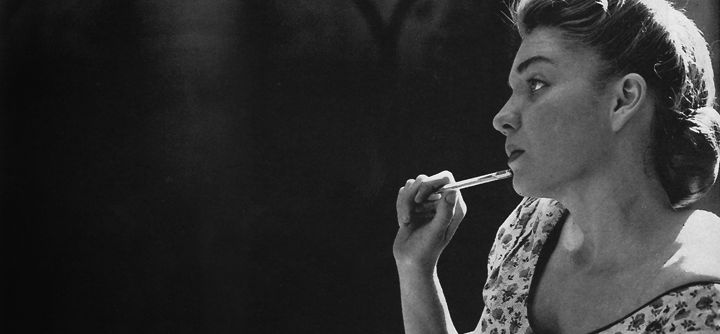
(Photography by Stephen Lewellyn; illustrations by Cissie)
Of sturdy stuff are poets made, or else they’d never make the grade.
 One familiar characteristic of poetry is its phoenix-like refusal to die permanently. Poetry has fought an uphill struggle through almost the entire lifetime of one member of the University of Chicago’s newest batch of alumni, Jane Cadmus Farley, AB’52. Despite some noteworthy obstacles, the yen to compose verse has kept on popping up. And in June, she was awarded the University’s John Billings Fiske prize for the year’s best-student verse. This was not only a poetic triumph, but also the happy solution to a then-pressing need for about $100, of which the tangible part of the award consists.
One familiar characteristic of poetry is its phoenix-like refusal to die permanently. Poetry has fought an uphill struggle through almost the entire lifetime of one member of the University of Chicago’s newest batch of alumni, Jane Cadmus Farley, AB’52. Despite some noteworthy obstacles, the yen to compose verse has kept on popping up. And in June, she was awarded the University’s John Billings Fiske prize for the year’s best-student verse. This was not only a poetic triumph, but also the happy solution to a then-pressing need for about $100, of which the tangible part of the award consists.
Poet Farley began composing verse at the age of 3; her mother jotted it down, in sheer maternal astonishment. The printed material she liked best to have read aloud was, at this time, the works of Spenser.
When Jane was in high school, in Battle Creek, Michigan, she worked mealtimes as a waitress and evenings as a librarian in the noted sanitarium there. This was in addition to her normal load of studies. But verse continued to emerge from her pen. At 14 she was chosen “junior poet laureate” of the state of Michigan. This distinction brought scant material benefits, but it did enable her to learn something about poetry, since the perquisite was the right to sit for a time at the feet of W. H. Auden.
Upon Jane’s graduation from high school, poetry lost a round to the stage, and she spent the next five years in and out of theatrical stock companies. The theater proved to have almost as demanding a muse as poetry, however; between engagements she learned typing, shorthand, and proofreading in various emergencies. Other theatrical dull periods, she modeled, taught calisthenics, and sang in night clubs, including Barney’s Bowery Bar at Coney Island.
In 1947, not altogether satisfied with the twists and turns of theatrical existence, Miss Farley wrote to the University of Chicago for permission to take an absentia scholarship examination. The Examiner’s findings indicated that a scholarship was in order; so, after a final fling at summer stock in Vermont, she entered the College in the autumn quarter of that year. The theater (and its attendant sub-vocations) gave way to the academic life (and its attendant parttime jobs) . But the muse also had moved to the Midway, and the lyrics continued to flow. The muse got an even better break when a case of exhaustion, plus a broken leg, kept Jane in Billings hospital for several months in 1949 and there was, for a while, plenty of time for composition.
The next year, after shifting from dissertation-typing to advertising copywriting as an avocation, Jane got married, moved to Chapel Hill, and turned to the writing of movie scripts. She also spent six months as publicity director for the North Carolina Symphony Society. At the University of North Carolina she was still carrying a full course load, and she had almost decided to concentrate on becoming a psychologist when she was invited to go to Greece with a State Department motion picture troupe. Her marriage meanwhile had broken up.
The brown hills of Greece, which had worked their witchery on many another poet, did not fail her, though the muse was now in competition with the Truman Doctrine. Back in the United States, het movie-making stint done, Jane returned to the Midway last January to finish her College studies. And to this summer’s good news of her graduation and of the Fiske award was added the further word that she had been accepted for graduate study in the University’s Department of Psychology. Characteristically, she celebrated these events by getting a summer job in a varnish factory.
Whatever the muse accomplishes from now on, it will have to do in competition with a crowded schedule of work in and out of the University. Even Jane is not sure she will have time for poetry any more. But the muse has been forced to learn persistence in keeping up with her until
now, and the odds remain good that poetry, like murder, will out.
